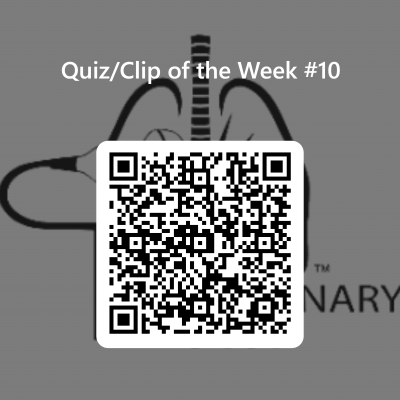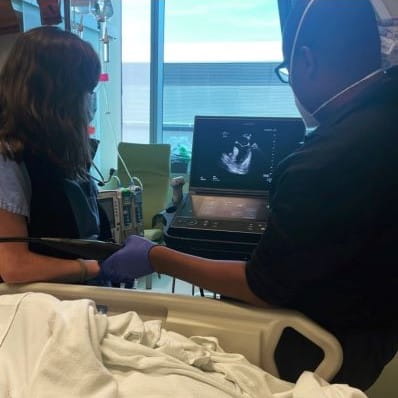Indiana University School of Medicine’s Pulmonary and Critical Care Medicine Fellowship is committed to providing world-class education and training in pulmonary and critical care medicine. Our Point of Care Ultrasound (POCUS) program equips fellows with essential skills and provides the opportunity to achieve ultrasound expertise. Our curriculum is designed to meet the National Board of Echocardiography standards and prepare learners to take the Examination of Special Competence in Critical Care Echocardiography.
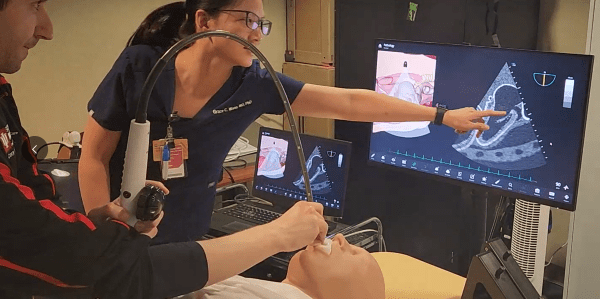
Core Ultrasound Competencies
Our fellowship program focuses on six core ultrasound competencies:
Focused Cardiac Echo
-
Global assessment of cardiac function
-
Evaluation for the presence of pericardial fluid
-
Identification of cardiac anatomic structures
Advanced Cardiac Echo
-
Use of color and spectral Doppler
-
Evaluation and measurement of right ventricular systolic pressure and right ventricular function
-
Evaluation and measurement of LVOT VTI, stroke volume, and cardiac output
Vascular Ultrasonography
-
Use of ultrasound to establish ultrasound guidance in establishing vascular access
-
Evaluation of lower extremity deep venous system to diagnose venous thromboembolism.
Abdominal and Thoracic Scanning
-
Identification of abnormal fluid collections in the torso
-
Use of ultrasound guidance for sampling ascites, pleural, and other fluid collections
Lung Ultrasound
-
Identification of pleural effusion, pneumothorax, and increased lung water
Critical Care Transesophageal Echo
-
Upper esophageal, mid-esophageal and transgastric views
-
Aorta
-
Transesophageal lung ultrasound
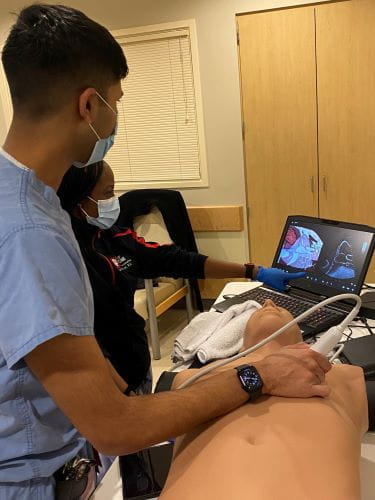
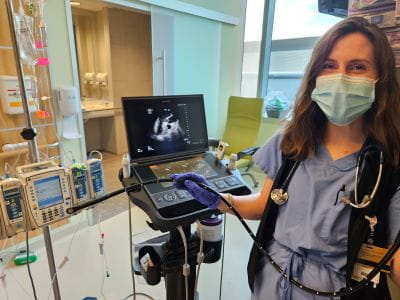
POCUS Related Publications
Resuscitative TEE
Bundy, A., Brenner, D. S., Andrade, H., Parker, C., Tomkiewicz, E., Grotberg, J., & Jackson, E. (2025). The use of bedside transesophageal echocardiography to relieve left ventricular outflow tract obstruction during cardiopulmonary resuscitation. CASE: Cardiovascular Imaging Case Reports. Advance online publication. https://doi.org/10.1016/j.case.2025.02.002
Duncan FC, Hunter NM, Carlos WG 3rd, Oshogwemoh O, Jackson EJ. The Great Disappearing Act: A Case of a Vanishing Right Ventricle Mass Revealed by Transesophageal Echocardiogram in Peripartum Cardiac Arrest. Chest. 2024;166(6):e197-e200. doi:10.1016/j.chest.2024.08.005
Andrade, H., Carroll, J., Tomkiewicz, E., & Jackson, E. (2024). Hemodialysis Catheter-Associated Right Atrial Thrombus Diagnosed via Point of Care Transesophageal Echocardiogram. POCUS journal, 9(1), 25–28. https://doi.org/10.24908/pocus.v9i1.16895
Ultrasound Protocols
Fraser, A., Brenner, D. S., Coghlan, M., Andrade, H., Haouili, M., Carlos, W. G., & Jackson, E. (n.d.). The Sound of Safety: DIVOT (Doppler Imaging for Vascular Orientation in Thoracic Procedures) Protocol. Indiana University School of Medicine.
General POCUS
Sanjuan, A., Brenner, D. S., Andrade, H., Bundy, A., Clapham, P., Markus, N., Hariri, I. K., & Jackson, E. (n.d.). Cardiac Point of Care Ultrasound (POCUS) Used to Diagnose Infective Endocarditis Following Multiple Negative Echocardiograms. Indiana University School of Medicine.
Certification Opportunities
Upon completion of our program, fellows can pursue certification in two key areas:
-
American Registry for Diagnostic Medical Sonography: Registered Diagnostic Cardiac Sonographer (RDCS)
-
National Board of Echocardiography: Board Certification by the National Board of Echocardiography CCEXAM
